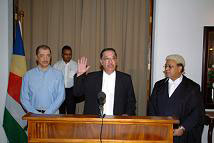


President James Michel has once again made a mockery of the spirit of the Constitution, in common with his predecessor and party leader Albert Rene. Last week Michel inconspicuously appointed Francis MacGregor as president of the Court of Appeal, the highest court in the land.
MacGregor is not just any person with a legal background. He was, and continued to be a card-carrying member of the SPPF as well as a member of its politburo or central committee, in stealth. Shortly before he took the oath, it was announced in the government daily newspaper, the Nation, that Macgregor had resigned from the Central Committee of the party. The article quoted a communiqué “issued from the Party’s secretariat”. No other media organisation – and certainly not this newspaper, received the communiqué.
MacGregor, however, remains a card-carrying member of the SPPF – the party that ruled our country under a dictatorship for 15 years. There is no law of course which says that a person cannot be both a member of a political party as well as a member of its executive committee while sitting as a judge. Mr France Bonte continued to be a card-carrying member of the party as well as a member of the Central Committee of the party while being the Chairman of the Constitutional Appointments Authority (CAA). As Chairman of CAA (his resignation only took effect on 1st July 2007) the body that appoints the judges, France Bonte also took part in the appointment of Francis Macgregor.
Unfortunately, there is no model for us to follow. In
What
Francis Macgregor’s new position will become even more ironic and paradoxical if not outright funny, if it was not so serious. Before taking his current responsibility, Macgregor presided over a legislature that effectively legislated away the right of the citizen to associate freely such as belonging to a political party. That constitutional sleight of hand is contained in the amendment, albeit controversial, to the Telecommunications Act, which was passed without challenge by him.
As the law stands today, anyone who so much as join together to form a political party or belong to a religious group, will loose the right of free speech via the radio or television, a very modern tool that is available to anyone in a modern and free society. That is the implication of the amendment. Paradoxically, the new law penalises you in restricting one of your fundamental rights (Article 22 - Freedom of expression), for exercising another fundamental right (Article 23 - Right of Assembly and Association). This is the most absurd situation which has developed post the introduction of multi party democracy in
Article 22(1) explicitly states, “Everyone has a right to freedom of expression and for the purpose of this article this right includes the freedom to hold opinions and to seek, receive and impart ideas and information without interference”. Hence, the amendment to the Telecommunications Act – which bars persons who have joined a political party or who belong to a religious faith from owning a broadcasting station, interferes with his right to “impart ideas and information”. Equally, it restricts all of us from receiving ideas and information.
Indeed, the Constitution does provide for a law that controls how broadcasting is done but only for the following reasons:
a) in the interest of defence, public safety, public order, public morality or public health;
b) for protecting the reputation, rights and freedoms or private lives of persons;
c) for preventing the disclosure of information received in confidence;
d) for maintaining the authority and independence of the court or the National Assembly;
e) for regulating the technical administration, technical operation, or general efficiency of telephones, telegraphy, posts, wireless broadcasting, television, or other means of communications or regulating public exhibitions or public entertainment;
f) for the imposition of restrictions upon public officers.
This last restriction in fact deprives government officials from using the broadcasting media for their own ends. They are the ones who should be restricted from using the broadcasting media.
It is evident that a challenge to the amendment and indeed the entire Telecommunications Act, is bound to reach the Court of Appeal eventually. How will MacGregor adjudicate? Will he stand down and allow his colleagues to make the final judgment? Is he going to influence the ultimate result of the judgment?
MacGregor also presided over a legislature, which passed a law that allowed the President of the Republic to appoint anyone to a constitutionally bogus position in the National Assembly and pay the person a salary of his own choosing. Macgregor not only endorsed this travesty and mockery of the constitutionality of laws, he also conspired with his party in doing so. Here we refer to the amendment to the National Assembly Emoluments Act, which created the post of leader of government business in the National Assembly. This amendment is likely to be challenged for its constitutional legitimacy and will also eventually end up before the Court of Appeal. When it does, the questions many people are asking are these: How will MacGregor adjudicate? Will he stand down and allow his colleagues to make the final judgement? Or, is he going to influence the ultimate result of the judgment?